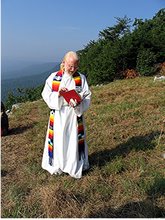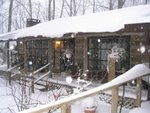AUTHORITY OF HUMAN SPEECH
One of the first things I learned after my initial experience was to pray in a different way than I had always been taught. Studying the Scriptures, it soon becomes clear that neither Jesus nor those who came after Him, prayed the way most people I knew, prayed.
Here are two examples of praying by the early followers of Jesus: First, is Peter’s and John’s first prayer for healing after they received the Holy Spirit. Acts 3:6 "In the name of Jesus Christ of Nazareth rise up and walk." And here is a prayer of Paul’s against demonic activity: Acts 16:18 Paul being grieved, turned and said to the spirit, "I command thee in the name of Jesus Christ to come out of her."
Having shown you these prayers, let me take you through the Bible, illustrating this way of praying that was all new to me. Beginning from the beginning in Genesis, God said to Moses: Num. 20:8 "Take the rod, and gather thou the assembly together, thou, and Aaron thy brother, and speak (can also be translated: "command") ye unto the rock before their eyes; and it shall give forth his water, and thou shalt bring forth to them water out of the rock: so thou shalt give the congregation and their beasts drink."
The Scriptures go on to say in Num 20:11: And Moses lifted up his hand, and with his rod, he smote the rock twice: and the water came out abundantly, and the congregation drank, and their beasts also.
Surprisingly, that action upset God.
Numbers 20:12: And the LORD spoke unto Moses and Aaron, "Because ye believed me not, to sanctify me in the eyes of the children of Israel, therefore ye shall not bring this congregation into the land which I have given them."
Wow! Hey God, Moses only changed one small detail. He struck the rock instead of speaking to it. He got water, so what was the problem?
Changing actions may not seem like a big thing to us, but obviously it was to God, so He now has caught our attention. Speaking to the rock, not hitting, was all that Moses changed from what he was told to do, but changing that minor detail, cost him. He did not get to lead the people finally into the promised land.
If speaking is that important to God, we had better spend some time thinking about that importance.
While teaching on the important subject of prayer, Jesus said to his disciples "Say unto this mountain" Mt 17:20. Sounds familiar doesn’t it?
"For verily I say unto you, That whosoever shall say unto this mountain, Be thou removed, and be thou cast into the sea; and shall not doubt in his heart, but shall believe that those things which he saith shall come to pass; he shall have whatsoever he says." Shortly before, Jesus had demonstrated the power of saying when he spoke to a fig tree and overnight it withered from its roots up.
Again one day while teaching on prayer, we see that word "say" again. The disciples approached Jesus and made a request: "Lord, teach us to pray as John also taught his disciples. And He said unto them, "When ye pray, say." Then He followed with a number of commands to be said. Luke 11:1-2
Say Hallowed be thy name
Say Thy kingdom come
Say Thy Will be done
"Say" even started the world.
And God said, "Let there be light": and there was light.
And God said, "Let the waters under the heaven be gathered together unto one place, and let the dry land appear": and it was so.
And God said, "Let the earth bring forth grass, the herb yielding seed, and the fruit tree yielding fruit after his kind, whose seed is in itself, upon the earth" and it was so.
God said, and it was so.
In Genesis 1:26 we learn: And God said, "Let us make man in our image, after our likeness: and let them have dominion over the fish of the sea, and over the fowl of the air, and over the cattle, and over all the earth, and over every creeping thing that creepeth upon the earth."
There are two hints in that passage as to where the power in human speech may originate: First, "in our own image", and second, "let them have dominion."
First, God says He created us in His own image. That strongly suggests God-like powers residual in us. Secondly, if God meant it when He gave us dominion over everything, then it follows that we exercise that dominion in the exact way the one in whose image we were created exercises power–by the word spoken directly towards that which we are to dominate.
No place in the Bible doess it suggest that God took back our dominion. However, it does appear that early on, God tampered with our abilities. Gen 11:6 And the LORD said "Behold, the people is one, and they have all one language and this they begin to do: and now nothing will be restrained from them, which they have imagined to do."
Gen 11:7 "Let us go down, and there confound their language." Whatever confound meant, somewhere along the way, we lost some of the real power of language, until Jesus came.
Going on with the word "say." Another interesting use of the word to say is that it is imbedded in the word "to prophesy." The Hebrew word for prophesy means "to say under inspiration."
When we watch Jesus pray; when we listen to him teach his disciple s to pray, we see an activity similar to what was called prophesying in the Old Testament. One day, years ago, while riding with a fellow minister, in an almost off-handed way, he said to me, "You realize, of course that the Hebrews understood "prophesying" as causative, that is, the prophet’s words caused the event, not just predicted it."
From the moment my friend gave me that revelation, prophesying was never the same to me.
"Saying"/prophesying as causative, is made dramatic in the story of Ezekiel and the dead bones. Eze 37:4: "Again he said unto me, ‘Prophesy upon these bones, and say unto them, O ye dry bones, hear the word of the LORD.’"
Eze 37:7: "So I prophesied as I was commanded: and as I prophesied, there was a noise, and behold a shaking, and the bones came together, bone to his bone."
An example that reveals "prophesying as causative," was understood by people in the Old Testament, is in the story of Balaam: The king had sent his servants to bring the prophet Balaam to him. Num 22:5. He sent messengers therefore unto Balaam the son of Beor to Pethor, which is by the river of the land of the children of his people, to call him, saying, "Behold, there is a people come out from Egypt: behold, they cover the face of the earth, and they abide over against me:
Num 22:6 Come now therefore, I pray thee, curse me this people; for they are too mighty for me: peradventure I shall prevail, that we may smite them, and that I may drive them out of the land: for I know that he whom thou blesses is blessed, and he whom thou curses is cursed"
Besides the king, God also took seriously, Balaam’s ability to speak with power. God intervened by doing all sorts of things to stop Balaam. Specifically, He commanded him not to curse the people for they were a blessed people.
People in New Testament times also recognized that there was power in the spoken word. The Roman Centurion said to Jesus: Mat 8:8 : "Lord, I am not worthy that thou shouldest come under my roof, but speak the word only, and my servant shall be healed."
Before going on let me just pile up some Scriptures running through the Old Testament into the New regarding the spoken word as causative:
Psa 33:6 By the word of the LORD were the heavens made; and all the host of them by the breath of his mouth. Psa 33:9 For He spoke, and it was done; He commanded, and it stood fast.
Psa 148:5 Let them praise the name of the LORD: for He commanded, and they were created.
Psa 148:6 He hath also established them forever and ever: He hath made a decree which shall not pass. Heb 11:3 Through faith we understand that the worlds were framed by the word of God, so that things which are seen were not made of things which do appear. Heb. 1:3 and continues to uphold the universe by the word of his power (Williams translation) He sustains the universe by his almighty word (Berkeley Version). And finally, Rev 12:11 And they overcame him (the adversary) by the blood of the Lamb and by the word (Greek: "something said") of their testimony.
Now with this background on the connection between the spoken word, and prayer/prophesying as causative, watch how Jesus prayed .in the following highlighted Scriptures: They were caught in a storm and the disciples were terrified, so they woke Jesus up. Mar 4:39: And he arose, and rebuked the wind, and said unto the sea, "Peace, be still." And the wind ceased, and there was a great calm. Mar 9:25: When Jesus saw that the people came running together, he rebuked the foul spirit, saying unto him, "Thou dumb and deaf spirit, I charge thee, come out of him, and enter no more into him." Luk 4:39: And he stood over her, and rebuked the fever; and it left her, and immediately she arose and ministered unto them.
Luk 9:42: And as he was yet coming, the devil threw him down, and tore him. And Jesus rebuked the unclean spirit, and healed the child.
Therefore, I have tried to learn to pray as Jesus prayed and as He taught his followers to pray. One example, that is both humorous and serious was the day the roofers tore the roof off my house, leaving only my bedroom ceiling between me and the sky. A big storm arose.
Around 10:00 a.m., shortly after they had everything bare, the sky began to darken ominously. In the past I would have panicked, especially because the men continued to work unhurriedly. But Jesus had fussed at a storm and he told the disciples that they should have done something and let him sleep.
So, imitating Jesus, I began to shout at the gathering storm.
The storm came closer. It began thundering and lightening. I began circling the yard, much like a guard dog, yelling at the storm in the name of Jesus. The workmen began to be entertained by my actions and kept on working.
Throughout the day, that storm circled us, much like a growling animal looking for an opportunity to pounce. The men continued work at their same pace. Finally around 3:00 p. m,. they had the beams of a new roof in place. As the storm came nearer and nearer, they began to quicken their pace, rolling down big sections of tar paper. Just as they had the last piece tacked down, a huge clap of thunder exploded. They came down the ladder like firemen coming down a pole, laughing all the way down. At that moment, the heavens opened and buckets of rain poured down.
Saturday, December 23, 2006
God gives us dominion
Subscribe to:
Post Comments (Atom)





0 comments:
Post a Comment